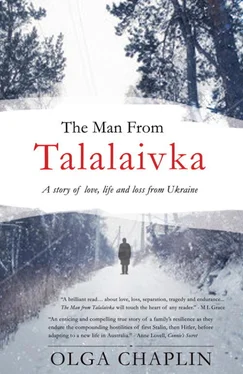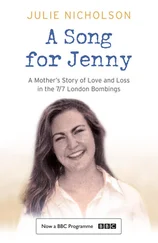* * *
“Dyna, leave the milking to me this morning… I’m already dressed… rest a little longer,” Peter whispered as Evdokia stirred, wincing in discomfort as she pulled at her straining petticoat.
He made his way to the barn and, with practised hands, attended to the waiting creature. Still pondering, he strode back to the farmhouse to wash at the trough. Suddenly his heart missed a beat. The sounds of crackling dried leaves nearby, of a distant motor rumbling on hardened earth, were unmistakable. He wiped the drops of water and clammy perspiration from his face and straightened, straining to hear.
“Vehod syde! Vehod syde!” The guttural command in unfamiliar Ukrainian confused him, but he understood its meaning. He raised his arms slowly, in submission. Another soldier appeared from the barn, then another, their rifles pointed at Peter and the farmhouse door.
“Everyone come out! Everyone come out!” the soldier shouted again. Peter nodded and gestured to himself, then to the door.
“I will call everyone,” he reacted instinctively, fearing a bloodbath in the panic. The soldier, eyes hidden behind the steely rim, jerked his helmet in consent. With one arm still raised as he cautiously pushed at the heavy door, Peter called to each occupant.
Other soldiers surrounded the farmhouse, positioning themselves in a well-drilled stance. A dozen kolkhoz workers and children, backs pressed to weathered timber walls, faced a dozen efficient, cocked rifles. The captain’s helmet tilted a fraction, eyes piercing, as he noted Evdokia’s heaving frame clinging to Mykola and Vanya, and watched her eyes pleading to Peter. He signalled to a soldier beside him, gave another order.
“Is everyone accounted for, in this farmhouse? Is anyone missing?” the interpreter commanded. The elders nodded: Dimitri’s absence was noted.
“Does anyone have a rifle… a pistol… any other weapon? You must tell us now!” The elders shook their heads, surprised. Stalin’s regime, with its decade of military and political purges, had long ago carried out reprisals for such misdemeanours.
“The horse in the barn… who rides it?” Peter raised his arm and gestured towards Talalaivka, briefly explained his work. The captain stepped closer, eyed him, calculating, then glanced back to the quivering group huddled against the wall.
“They are your family?” He pointed to Evdokia and the children. Peter nodded.
“And you leave them to work in this… Talalaivka?” Peter nodded again. The captain pursed his lips, observing Evdokia’s extreme condition.
“Good!” he commanded. “You come with us. We are heading to Talalaivka now. You will be helpful to us. The others,” he flicked his hand in dismissal, “must stay on this farm. If they leave, they will be shot.”
His stomach pitted tight as a drum, Peter glanced helplessly at Evdokia as she held fast to the children and forced back her tears, too fearful of the rifles to break down. He touched her shoulder gently, gestured to her not to despair. At that moment, with rifles still aimed at them, the drone of overloaded Russian TB-3 bombers heading westward for their battle around Kiev brought the cold reality of this war to their very doorstop. He realised with a sinking heart how dangerous it was to be a countryman or woman of Ukraine. No place was safe now: they were being attacked in the countryside, in towns, on battlefields. The cost, the carnage, would be horrific.
As he steadied his horse to take its place in the posse of armoured cars and soldiers on horseback pulling their supply wagons, he looked wistfully at the forlorn families: captives in their own land, German soldiers stationed at their door, rifles pointed at their backs. His throat tightened to gripping point as he watched Evdokia and the others being herded back into the farmhouse.
He brushed at his eyes and pulled at the horse’s reins to distract himself, and looked towards Talalaivka. He could only guess at what might be required of him. He prayed, above all, that he would not be made to do something he would regret for the remaining days of his life. The war encouraged amazing acts of bravery. But it also excused acts of unimaginable cruelty. Already, Hitler’s ruthless tactics in western Europe were attesting to this.
One more time, as the convoy moved into the country lane, he strained to glimpse the farmhouse. Instead, he caught a glint from the bonnet of the vehicle tailing them. The SS officers, in their impeccable leather jackets, belts firmly buckled and boots polished to extreme, were well protected in their armoured vehicle. Peter did not know the real role these SS men played in their ignoble operations, of the over-riding power they wielded, so effectively, all in the name of higher ideals. Still hopeful, he could not know the full intent of Hitler’s war against the Ukraine and Russia, did not realise what kind of sentence would be meted out to his people.

Chapter 21
From a distant field a motorcycle, revved-up at full throttle, sounded its urgent delivery. The posse paused at the bend; captain and soldiers watchful as the skilled driver, manoeuvring and zig-zagging his beast over harvested wheat mounds, sped towards the motorcade. Despite his predicament, Peter watched, fascinated, as split-second images of rider and machine flashed between the stagnating stalks that, like upright prison bars, were suddenly smashed open and flattened as the automaton tore towards them. The German soldier jumped off his motorcycle, brakes grinding, a cloud of dust smothering him. Back straight as he clicked his muddy boots and saluted, he handed the captain his document. The senior nodded as he perused the missive, a hint of a smile softening his determined face.
“Gute, gute!” he replied, fully understanding its import, wrote a brief reply and signalled the messenger to return it to senior command. Within moments, the rider raced his motorcycle off at breakneck pace back through the fields, the heady motor fumes spurting a fine spray that hit Peter’s nostrils like an acrid atomiser.
“It’s amazing!” he thought to himself, patting his horse’s quivering coat as the revving motor resounded across the fields. “Our soldiers are struggling to find a horse and cart for their defences, yet this army has everything in its power to push ahead. They won’t be stopped in their aim to take Moscow!” But already the autumn leaves were being denuded, and he reminded himself of winter’s cruel early snows, even in his Ukraine. Ponds, lakes, even essential roadways were often overnight suddenly frozen or made impassable, trapping all who travelled. “But the German army must know this… that Ukrainian and Russian winters are more severe than their own.”
Another posse of soldiers joined their motorcade at a crossroad as a narrow lane met the rough roadway. The captain’s interpreter waved Peter forward.
“Pomozhe, pomozhe tyt,” his guttural Ukrainian barely understood. As Peter reached the front of the line the captain looked up from a large map spread over the bonnet of a truck. His juniors leaned over it in obsequious helpfulness. He glanced up, mouth tightening, brow creased in frustration.
“All these country roads… we must reach Talalaivka in the shortest time… we have deadlines!” Peter guessed, correctly, that they must now be pushing at speed to secure not just Talalaivka, but the larger Konotop railway junction, which was strategically vital in sending their troops and supplies from north-east Ukraine, and linked other main lines through Orel, Tula, and on to Moscow. And only when Konotop, so relatively close to Russia’s borders, was taken could Hitler be confident of his earlier boasting that Stalin’s ‘scorched earth’ policy had ceased, and failed, and that the Ukraine—and even Moscow—would be his before year’s end.
Читать дальше













